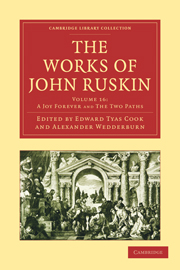Book contents
- Frontmatter
- Contents
- LIST OF ILLUSTRATIONS
- INTRODUCTION TO THIS VOLUME
- PART I “A JOY FOR EVER” BEING THE SUBSTANCE (WITH ADDITIONS) OF TWO LECTURES ON THE POLITICAL ECONOMY OF ART (1857, 1880)
- PART II INAUGURAL ADDRESS AT THE CAMBRIDGE SCHOOL OF ART (1858)
- PART III THE OXFORD MUSEUM (1858, 1859)
- PART IV “THE TWO PATHS” (1859)
- APPENDIX: ADDRESSES AND LETTERS 1856–1860
- I REMARKS ON THE RECENT PROGRESS OF DESIGN AS APPLIED TO MANUFACTURE (MARCH 12, 1856)
- II AN ADDRESS TO THE WORKMEN EMPLOYED ON THE OXFORD MUSEUM (APRIL 18, 1856)
- III THE VALUE OF DRAWING: ADDRESS TO THE ST. MARTIN'S SCHOOL OF ART (APRIL 3, 1857)
- IV THE PRESERVATION OF ITALIAN PICTURES: REMARKS AT A MEETING OF THE ARUNDEL SOCIETY (JUNE 25, 1857)
- V THE ARTS AS A BRANCH OF EDUCATION: A LETTER TO THE REV. F. TEMPLE (SEPTEMBER 27, 1857)
- VI THE STUDY OF ART: ADDRESS TO THE ST. MARTIN'S SCHOOL OF ART (APRIL 16, 1858)
- VII VENETIAN ARCHITECTURE: REMARKS MADE AT A MEETING OF THE ARCHITECTURAL PHOTOGRAPHIC SOCIETY (FEBRUARY 15, 1859)
- VIII RELIGIOUS ART: REMARKS MADE AT A MEETING OF THE WORKING MEN'S COLLEGE (MARCH 8, 1860)
- IX EVIDENCE GIVEN BEFORE THE SELECT COMMITTEE ON PUBLIC INSTITUTIONS (MARCH 20, 1860)
- Plate section
VII - VENETIAN ARCHITECTURE: REMARKS MADE AT A MEETING OF THE ARCHITECTURAL PHOTOGRAPHIC SOCIETY (FEBRUARY 15, 1859)
Published online by Cambridge University Press: 07 September 2011
- Frontmatter
- Contents
- LIST OF ILLUSTRATIONS
- INTRODUCTION TO THIS VOLUME
- PART I “A JOY FOR EVER” BEING THE SUBSTANCE (WITH ADDITIONS) OF TWO LECTURES ON THE POLITICAL ECONOMY OF ART (1857, 1880)
- PART II INAUGURAL ADDRESS AT THE CAMBRIDGE SCHOOL OF ART (1858)
- PART III THE OXFORD MUSEUM (1858, 1859)
- PART IV “THE TWO PATHS” (1859)
- APPENDIX: ADDRESSES AND LETTERS 1856–1860
- I REMARKS ON THE RECENT PROGRESS OF DESIGN AS APPLIED TO MANUFACTURE (MARCH 12, 1856)
- II AN ADDRESS TO THE WORKMEN EMPLOYED ON THE OXFORD MUSEUM (APRIL 18, 1856)
- III THE VALUE OF DRAWING: ADDRESS TO THE ST. MARTIN'S SCHOOL OF ART (APRIL 3, 1857)
- IV THE PRESERVATION OF ITALIAN PICTURES: REMARKS AT A MEETING OF THE ARUNDEL SOCIETY (JUNE 25, 1857)
- V THE ARTS AS A BRANCH OF EDUCATION: A LETTER TO THE REV. F. TEMPLE (SEPTEMBER 27, 1857)
- VI THE STUDY OF ART: ADDRESS TO THE ST. MARTIN'S SCHOOL OF ART (APRIL 16, 1858)
- VII VENETIAN ARCHITECTURE: REMARKS MADE AT A MEETING OF THE ARCHITECTURAL PHOTOGRAPHIC SOCIETY (FEBRUARY 15, 1859)
- VIII RELIGIOUS ART: REMARKS MADE AT A MEETING OF THE WORKING MEN'S COLLEGE (MARCH 8, 1860)
- IX EVIDENCE GIVEN BEFORE THE SELECT COMMITTEE ON PUBLIC INSTITUTIONS (MARCH 20, 1860)
- Plate section
Summary
1. Mr. Ruskin, on taking the chair as announced, said that, in being permitted to introduce Mr. Street to the meeting, it was no part of his duty to insist on the value or interest of the present collection. Its usefulness must be patent to all; and, for the rest, it had been explained in a most admirable manner by their excellent chairman at the last meeting of the Society. He might, however, be permitted to detain the assembly for a few minutes, whilst referring to a principal feature in the collection of photographs. The attention of the Society had been mainly devoted to two Italian cities, which were interesting, not only in consequence of their past history, but of their present political position. Not only at this moment, but for many years to come, these two cities, Venice and Verona, must be in constant danger of almost total destruction, in the event of any political movements taking place in Italy. The military preparations that had been made by Austria rendered this almost a matter of certainty. The Austrian guns bore straight down on the façade of the Ducal Palace and on the very centre of the town of Verona, and it mainly depended on chance whether that palace might not be shaken into the dust almost before any effort could be made to remove the causes that would give occasion for such an exhibition of authority.
- Type
- Chapter
- Information
- The Works of John Ruskin , pp. 461 - 468Publisher: Cambridge University PressPrint publication year: 2010First published in: 1905



